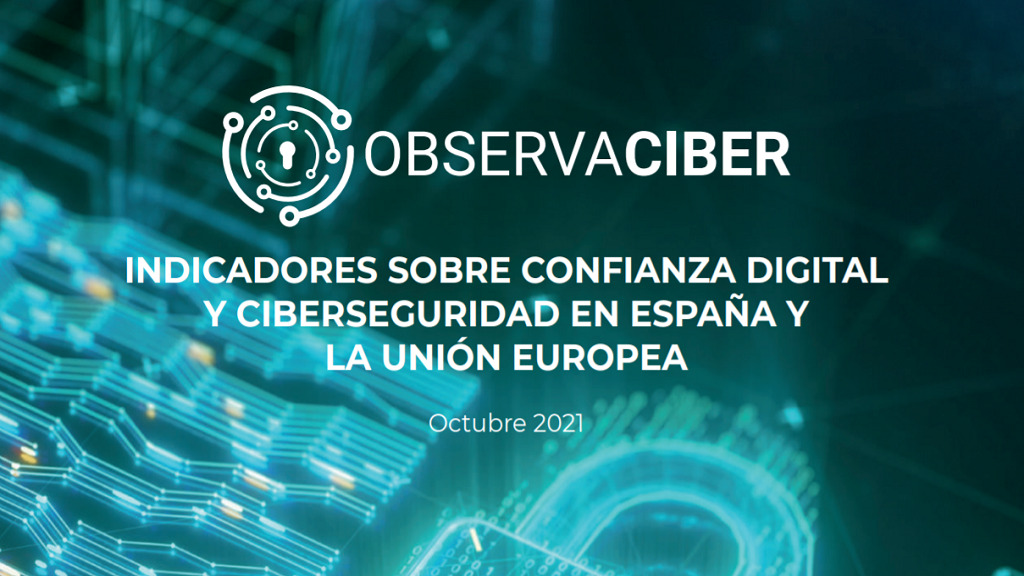
The organism, Watch cyber, coordinated by the National Observatory of Technology and Society (ONTSI) and the National Cybersecurity Institute (INCIBE) has published the Report on indicators on trust and cybersecurity in Spain and the European Union.
The document collects data from 2019 and 2020 related to outstanding indicators on digital trust both in companies and among the population, to the analysis of confidence of citizens and companies in the digital environment and the global cybersecurity index published by the International Telecommunications Union (ITU).
According to the report, more than half of Spanish companies had defined an ICT security policy in 2019, but only 25% had defined or reviewed it in the last 12 months. 33% of Spanish companies had documentation on ICT security in 2019, one percentage point less than the average for the European Union. However, this percentage reaches 72% among large Spanish companies.
The level of utilization of internal ICT security systems by Spanish companies it is very high, 96.3% of them declared having one in 2020. The most used ICT security measure (97%) is to have updated software, in addition to possible ICT security incidents, 18% of the Spanish companies have insurance to deal with them compared to 24% of European companies. To manage ICT security, Spanish companies use more external resources (67%) than internal ones (38%).
Keep working people aware and trained in ICT security It is one of the key aspects to reduce incidents and strengthen digital trust in companies. In Spain, 21% of companies give compulsory ICT security training and 41% voluntary, values below the European average of 24% and 44%, respectively.
Spain is one of the countries that exhibits a greater commitment to cybersecurity
This is reflected in the fourth position that Spain occupies in 2020 in the global cybersecurity index prepared by the International Telecommunications Union (ITU) of the United Nations to measure the commitment of countries to cybersecurity.
Of all the countries analyzed, It is only behind the US, UK, Saudi Arabia and Estonia, and equals the position with South Korea and Singapore. In the context of the EU27, Spain (with a score of 98.52 out of 100) is in second position, only behind Estonia (99.48 points).
On the other hand, the report shows that public mistrust in the digital environment is increasing: two out of every five people have little or no trust in the Internet. Although more than half of the population (55.3%) had high (51.1%) or enough (4.2%) confidence in the Internet in 2020, the percentage with little or no confidence in the Internet has increased by 8 , 4 points in the last year, reaching 37.9%.
This lack of confidence negatively affects to online transactions, in Spain 16% of people and in the European Union 6% declare that they do not make purchases online due to concerns about privacy or security when paying online. It also negatively affects the development of electronic administration, according to the report in 2020, 19% of the population in Spain and 14% in Europe who needed to send a form and did not do so indicate their concern about protection and protection as a reason. security of your personal data.
Lower percentage of cybersecurity incidents that affect people in Spain than in the European Union globally, but higher in pharming and loss of mobile data as a result of a virus
28% of the Spanish population suffered a cybersecurity incident in 2019, while the European average stood at 34%. The most notable incidence is the reception of fraudulent messages (phishing) that affected 19.2% of the Spanish population and 26% of the European population. Another notable incident is being redirected to false web pages that request personal information (pharming), which in Spain affected 17% of the population, in this case above 13% of the European Union average. In 2020, 8% of the Spanish population that accesses the Internet through mobile phones declared data loss as a result of a virus, above 4% of the European
Unequal use of security systems on computers and mobiles
In Spain a little more than half of the population (52%) and in Europe a little less (48%) made backup copies of files (documents, images, etc.) of their computers in 2019. In the mobile, 31% of the Spanish population and 39% of the European population declare to have a security system installed automatically or provided with the smartphone operating system in 2020.
A large majority of the citizenry sabe that cookies can be used to track movements of people on the Internet. This is stated by 66% of the Spanish population and 69% of the European population in 2019. However, not many take actions to limit the use of cookies, in Spain 29% of the population do so and in the EU27 the 32%. Fewer people use software that limits their ability to track their Internet activities, in Spain 14% of people and in Europe 17%.
Regarding the protection of personal data, a large majority (74%) of the Spanish population took some action to manage access to personal data on the Internet in 2020. In the case of applications installed on mobile phones, more than half of the Spanish population (57%) restricted or denied access to personal data at least once in 2020, above the European Union average of 52%.
Finally, not many companies report having suffered ICT security incidents. In Spain, 9% of companies declared that their ICT services were not available, the same proportion as in the case of the European Union average. Another of the most common incidents is the destruction or corruption of data, which affected 7% of Spanish companies and 5% of European companies in 2019.



